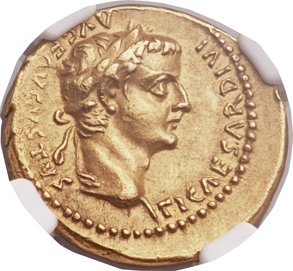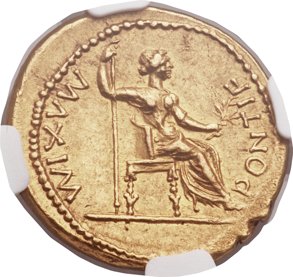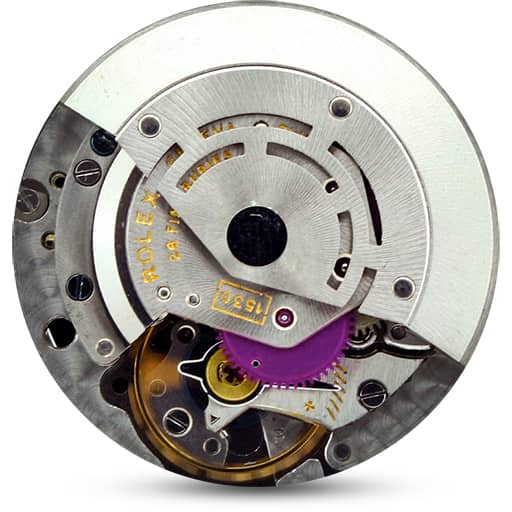Additional References: Calicó 305a
Notes: Laureate head of Tiberius right / Livia, as Pax, seated right, holding scepter and olive branch; chair with ornate legs, feet on footstool, single line below.
Obverse: Tiberius (Latin: Tiberius Caesar Divi Augustī Filius Augustus; 16 November 42 BC - 16 March 37 AD) was a Roman Emperor from 14 AD to 37 AD. Born Tiberius Claudius Nero, a Claudian, Tiberius was the son of Tiberius Claudius Nero and Livia Drusilla. His mother divorced Nero and married Octavian, later known as Augustus, in 39 BC, making him a step-son of Octavian.
Tiberius would later marry Augustus' daughter (from his marriage to Scribonia), Julia the Elder, and even later be adopted by Augustus, by which act he officially became a Julian, bearing the name Tiberius Julius Caesar. The subsequent emperors after Tiberius would continue this blended dynasty of both families for the following thirty years; historians have named it the Julio-Claudian dynasty. In relations to the other emperors of this dynasty, Tiberius was the stepson of Augustus, grand-uncle of Caligula, paternal uncle of Claudius, and great-grand uncle of Nero.
Tiberius was one of Rome's greatest generals; his conquest of Pannonia, Dalmatia, Raetia, and temporarily, parts of Germania, laid the foundations for the northern frontier. But he came to be remembered as a dark, reclusive, and sombre ruler who never really desired to be emperor; Pliny the Elder called him tristissimus hominum, "the gloomiest of men."
After the death of Tiberius? son Drusus Julius Caesar in 23 AD, he became more reclusive and aloof. In 26 AD Tiberius removed himself from Rome and left administration largely in the hands of his unscrupulous Praetorian Prefects Lucius Aelius Sejanus and Quintus Naevius Sutorius Macro.
Caligula, Tiberius' grand-nephew and adopted grandson, succeeded Tiberius upon his death.
From Wikipedia
Tiberius would later marry Augustus' daughter (from his marriage to Scribonia), Julia the Elder, and even later be adopted by Augustus, by which act he officially became a Julian, bearing the name Tiberius Julius Caesar. The subsequent emperors after Tiberius would continue this blended dynasty of both families for the following thirty years; historians have named it the Julio-Claudian dynasty. In relations to the other emperors of this dynasty, Tiberius was the stepson of Augustus, grand-uncle of Caligula, paternal uncle of Claudius, and great-grand uncle of Nero.
Tiberius was one of Rome's greatest generals; his conquest of Pannonia, Dalmatia, Raetia, and temporarily, parts of Germania, laid the foundations for the northern frontier. But he came to be remembered as a dark, reclusive, and sombre ruler who never really desired to be emperor; Pliny the Elder called him tristissimus hominum, "the gloomiest of men."
After the death of Tiberius? son Drusus Julius Caesar in 23 AD, he became more reclusive and aloof. In 26 AD Tiberius removed himself from Rome and left administration largely in the hands of his unscrupulous Praetorian Prefects Lucius Aelius Sejanus and Quintus Naevius Sutorius Macro.
Caligula, Tiberius' grand-nephew and adopted grandson, succeeded Tiberius upon his death.
From Wikipedia
Denomination: The aureus (pl. aurei - "golden") was a gold coin of ancient Rome valued at 25 silver denarii. The aureus was regularly issued from the 1st century BC to the beginning of the 4th century AD, when it was replaced by the solidus. The aureus was about the same size as the denarius, but heavier due to the higher density of gold (as opposed to that of silver.)
Before the time of Julius Caesar the aureus was struck very infrequently, usually to make large payments from captured booty. Caesar struck the coin more frequently and standardized the weight at 1/40 of a Roman pound (about 8 grams). Augustus (r. 29 BC - 9 AD) tariffed the value of the sestertius as 1/100 of an aureus. The mass of the aureus was decreased to 1/45 of a pound (7.3 g) during the reign of Nero (r. 54 - 68).
After the reign of Marcus Aurelius (r. 161 - 180) the production of aurei decreased, and the weight was further decreased to 1/50 of a pound (6.5 g). During the 3rd century, gold pieces were introduced in a variety of fractions and multiples, making it hard to determine the intended denomination of a gold coin.
From Wikiepedia
Before the time of Julius Caesar the aureus was struck very infrequently, usually to make large payments from captured booty. Caesar struck the coin more frequently and standardized the weight at 1/40 of a Roman pound (about 8 grams). Augustus (r. 29 BC - 9 AD) tariffed the value of the sestertius as 1/100 of an aureus. The mass of the aureus was decreased to 1/45 of a pound (7.3 g) during the reign of Nero (r. 54 - 68).
After the reign of Marcus Aurelius (r. 161 - 180) the production of aurei decreased, and the weight was further decreased to 1/50 of a pound (6.5 g). During the 3rd century, gold pieces were introduced in a variety of fractions and multiples, making it hard to determine the intended denomination of a gold coin.
From Wikiepedia
Period: Imperial Rome. As the Roman Republic began to implode because of
corruption and infighting among powerful members of the Roman Senate, a new type of
Roman Republican coinage emerges, that of the military strongmen who dominated and
fought among each other before the final fall of the Republic. The drama surrounding
the fall of the Roman Republic is a story full of political intrigue, military action, betrayal,
murder and sex scandals. Different parts of this story have been told and retold by
ancient historians, modern day scholars, dozens of Hollywood movies and even an HBO
miniseries. All of the actors in this great drama, Crassus, Pompey, Julius Caesar, Brutus
and Cassius, Mark Antony and Cleopatra and the last man standing at the end of it all,
Octavian (later known as the first emperor of Rome, Emperor Augustus) all minted coins
during this time bearing their names and propaganda images supporting their factions
and political ideals.
Culture: Ancient Rome. A famous catch phrase "Rome was not built in a day"
definitely applies to the Roman civilization. Rome stated as a series of small villages among the
famous seven hills of Rome along the river Tiber. Eventually through conquest, diplomacy, wise
policies of indirect rule and assimilation, the Romans were able to not only unify the Italian
peninsula, but though a series of brutal wars against regional powers established a great Empire
that spanned Europe, Asia and Africa, making the Mediterrean Sea and "Roman Lake."
All Roman coinage can generally be divided into eight time periods as described below. An interesting thing about Roman coins minted during these eight time periods is that you can literally see the "Rise and Fall" of the Roman Empire on its coinage as the sharp imagery and pure silver and gold coins of the Roman Republic and Early Imperial Period gradually devolves into crude, illegible and heavily debased coins of the "Barracks Emperors" and "Barbarian" Period.
All Roman coinage can generally be divided into eight time periods as described below. An interesting thing about Roman coins minted during these eight time periods is that you can literally see the "Rise and Fall" of the Roman Empire on its coinage as the sharp imagery and pure silver and gold coins of the Roman Republic and Early Imperial Period gradually devolves into crude, illegible and heavily debased coins of the "Barracks Emperors" and "Barbarian" Period.
Item created by: gdm on 2016-08-14 11:54:56. Last edited by gdm on 2016-08-14 16:28:09
If you see errors or missing data in this entry, please feel free to log in and edit it. Anyone with a Gmail account can log in instantly.
If you see errors or missing data in this entry, please feel free to log in and edit it. Anyone with a Gmail account can log in instantly.








